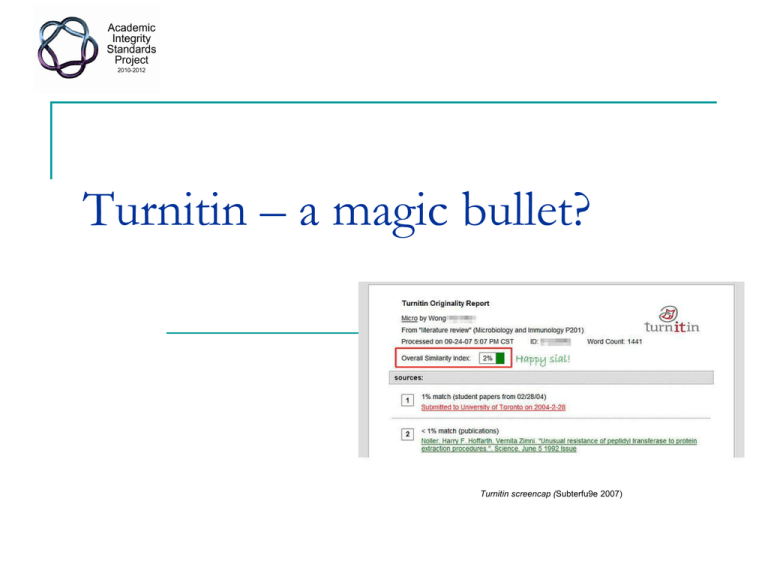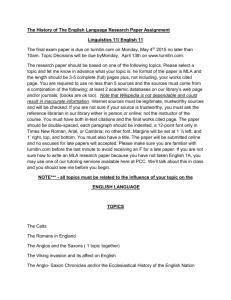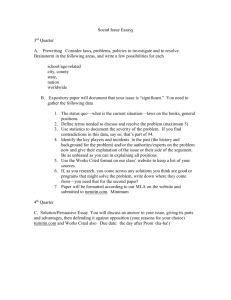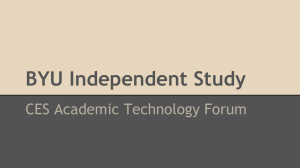pptx - Academic Integrity Standards Project
advertisement

Turnitin – a magic bullet? Turnitin screencap (Subterfu9e 2007) Purpose of case study Target audience: teaching staff, program coordinators, academic integrity breach decision makers Key issue being addressed: the appropriate use of text-matching software programs like Turnitin Purpose of the case: To facilitate discussion about the appropriate use of Turnitin to manage plagiarism and assessment tasks Materials and preparation needed to answer case: Copy of university academic integrity policy and procedures Rees M and Emerson L (2009) ‘The impact that Turnitin has had on text-based assessment practice’, International Journal for Educational Integrity 5(1) 20-29 Shaw C (2012) ‘Use of Turnitin software does not deter cheating, study finds’ Times Higher Education Supplement. 19th January www.timeshighereducation.co.uk/story.asp?sectioncode=26&storycode=418740 Devlin M (2006) ‘Policy, preparation and prevention: Proactive minimisation of student plagiarism’ Journal of Higher Education Policy and Management, 28(1) 45-58 Academic Integrity Standards Project 2010-2012 2 Our research Policy analysis Only 39% of policies identified the institution as being responsible for academic integrity Only 33% of policies identified the use of a tool such as text matching software to detect plagiarism Interviews with 28 senior academic integrity stakeholders at 6 Australian universities No. 1 recommendation for good practice: Provide appropriate and on-going professional development for all staff in relation to academic integrity policy and process. Academic Integrity Standards Project 2010-2012 3 Case Study: Florence Florence teaches a communications and academic writing program in a business studies faculty. The faculty has a policy that students must attach a Turnitin report to all of their assessment tasks. In orientation programs, students are told about how Turnitin will detect correlations between their writing and any online research sources, or previously submitted versions of the same assignment from other students They are told that 'the closest to zero they get in their Turnitin report, the better'. Academic Integrity Standards Project 2010-2012 4 Students get worried Florence’s students are worried, and tell her how they struggle to strip out quotes and paraphrases in their work to get it down to a zero result. Florence advises students that they shouldn't focus too much on the Turnitin scores, but should focus on writing well in response to the question and assignment instructions, make sure that they acknowledge their sources. Florence tells them students that of course the teachers who are marking their assignments in other subjects will double-check the Turnitin report, most likely to ensure that no outrageous plagiarism has occurred, but that their grades have no real correlation with the Turnitin scores. Academic Integrity Standards Project 2010-2012 5 Staff are misusing Florence later comes across a memo from the sub-dean of the Faculty to new sessional teaching staff with instructions about how to use Turnitin. This memo is accompanied with a table that matches a range of Turnitin scores with recommended assignment grade scores, with zero percent from Turnitin in the high distinction bracket. When Florence talks about this to her colleagues, she is told that other teachers like Turnitin because it has cut down on their workload: not only does it help streamline marking, it also means that subject coordinators don't have to rewrite assignment questions for essays and reports, which they would normally do to avoid students copying from previous year's work. Academic Integrity Standards Project 2010-2012 6 Questions for discussion 1. 2. 3. Does your university policy say anything about the use of textmatching software programs like Turnitin? If it does, is the program presented as a plagiarism detection tool or an academic integrity educative tool? How might text-matching software programs like Turnitin be used to help students avoid plagiarism and aid teaching staff in educating students about the value of academic integrity? Brainstorm other uses of Turnitin to consider how it might be usefully used to educate students about appropriate acknowledgement practices Academic Integrity Standards Project 2010-2012 7 References and resources Bretag, T., Mahmud, S., East, J., Green, M., James, C., McGowan, U., Partridge, L., Walker, R. & Wallace, M. (2011). Academic Integrity Standards: A Preliminary Analysis of the Academic Integrity Policies at Australian Universities, Australian Universities Quality Forum, 29 June-1 July, Melbourne, Australia. Bretag, T., Mahmud, S., Wallace, M., Walker, R., James, C., Green, M., East, J., McGowan, U. & Partridge, L. (2011). Core elements of exemplary academic integrity policy in Australian higher education, International Journal for Educational Integrity, Vol 7(2), pp. 3-12, available online: http://www.ojs.unisa.edu.au/index.php/IJEI/article/viewFile/759/574 Subterfu9e (2007), Turnitin screencap , digital image, accessed on 27 August 2012, http://www.flickr.com/photos/subterfu9e/1433364455/ , This image is used with permission under an Attribution 2.0 Creative Commons License. Academic Integrity Standards Project 2010-2012 8 For further resources from the Academic Integrity Standards Project, please go to: http://www.aisp.apfei.edu.au Support for this project/activity has been provided by the Australian Government Office for Learning and Teaching. The views in this project do not necessarily reflect the views of the Australian Government Office for Learning and Teaching. This work is licensed under a Creative Commons Attribution-NonCommercial-ShareAlike 3.0 Australia License Academic Integrity Standards Project 2010-2012 9


